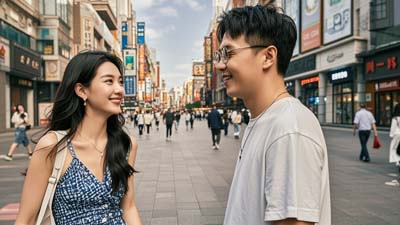
Chinese greetings are very useful in daily living. Chinese Greetings will provide you basic Chinese greeting sentences in the situation where people run into an acquaintance. For example, when a Chinese person comes across an older acquaintance, he/she may address the person respectfully, such as “Aunt Zhang”, “Uncle Wang” or “How are you, Aunt Zhang?” or “Good morning, Grandpa Li.”. To people close to you in age, you may just say “Ni hao” (Hi/Hello) if you don’t know the person well. If you know the person well and say “Ni hao” to him/her, it may sound a bit strange. If you run into someone younger than you, it is proper to greet him/her by saying his/her name or asking about something to show your concern.
Rebecca and Wang Bo run into each other at Wangfujing.
Wánɡ Bō: Lìbèikă!
王 波: 丽贝卡!
Wang Bo: Hi, Rebecca!
Lì Bèikǎ: Hēi, Wáng Bō! Zhème qiăo, zài zhèér pèngjiàn nĭ.
丽贝卡: 嘿, 王 波! 这么 巧, 在 这儿 碰见 你。
Rebecca: Hi,Wang Bo! What a surprise to meet you here!
Wánɡ Bō: Shìa, tài qiăo le. Nĭ zuìjìn zĕnme yàng? Nĭ lái măi dōngxi ma?
王 波:是啊,太 巧 了。你 最近 怎么 样? 你 来 买 东西 吗?
Wang Bo: You too! How are you these days? Are you doing some shopping here?
Lì Bèikǎ: Hĕn hăo, Wŏ hĕn xĭhuan Bĕijīng. Wŏ tīngshuō wángfŭjĭng hĕn yŏumíng,jiù lái suíbiàn guàngguàng. Nĭ ne?
丽贝卡: 很 好, 我 很 喜欢 北京。 我 听说 王府井 很 有名 ,就 来 随便逛逛。你 呢?
Rebecca: Yes, I like Beijing very much. I’m just walking around since I hear Wangfujing is very famous. What about you?
Wánɡ Bō: Wŏ shì lái măi shū de. Yào shì fāngbiàn, wŏ péi nĭ yìqǐ guàng ba.
王 波: 我 是 来 买 书 的。要 是 方便, 我 陪 你 一起 逛 吧。
Wang Bo: I’m here to buy some books. If you’d like, I can take you around.
Lì Bèikǎ: Tài hăo le, wŏ duì zhèér bù shú, zhèng hăo xūyào yígè xiàngdăo.
丽贝卡:太 好 了,我 对 这儿 不 熟, 正 好 需要 一个 向导。
Rebecca: That’ll be great. I don’t know this place well and really need a guide.
Zhème qiăo, zài zhèér pèngjiàn nĭ.
1. 这么 巧, 在 这儿 碰见 你。
What a surprise to meet you here!
Yào shì fāngbiàn, wŏ péi nĭ yìqǐ guàng ba.
2. 要 是 方便, 我 陪 你 一起 逛 吧。
If you’d like, I can take you around.
Nĭ zuìjìn zĕnme yàng?
3. 你 最近 怎么 样?
How are you these days?
Also, at different occasions and locations, different Chinese greatings might be used. During mealtimes, you may hear people greet each other by asking, “Have you eaten?” or, “You’re up so early?” when it is early in the morning; or, “Where are you going?” when out on the street; or, “You haven’t gone to bed yet?” at night. These questions may sound very specific, but they are often rhetorical, so people just nod their head with a smile or give a simple response. That will do.




